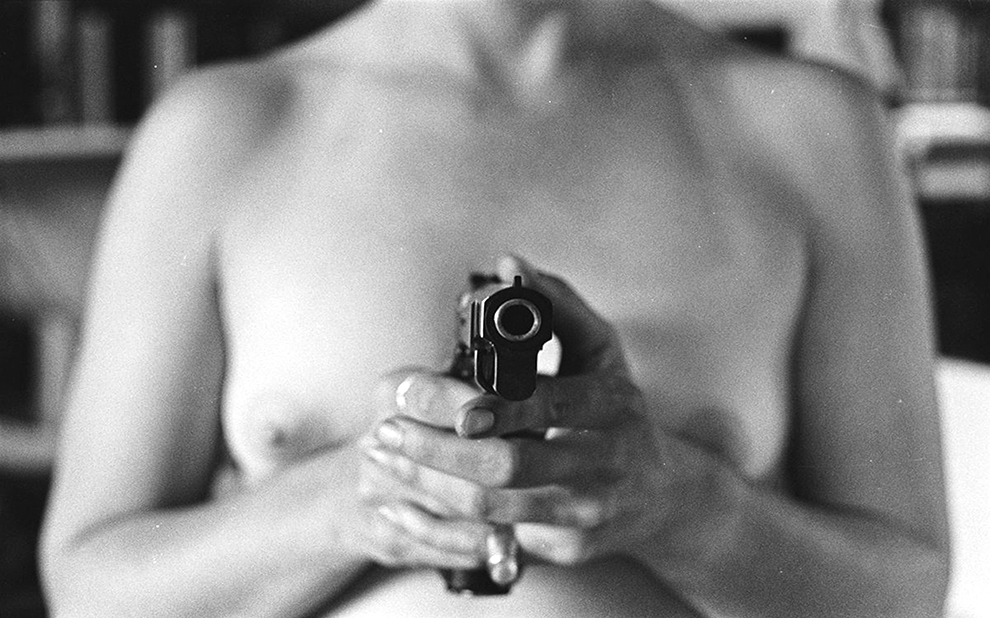Launch Event: 2-4pm Saturday 31 May / All Welcome
“Seeing, hearing, speaking, breathing, living, all these wait to be made fecund by an innocent potency.“
Irigaray (Elemental Passions, 1992)
Taking its title from Luce Irigaray’s interrogation of language and love, this exhibition features artists working with photography and conceptual practices, including archival 1970s and 1980s works by Alexis Hunter, Karen Knorr and Jo Spence, alongside a series of contemporary artists whose works all use the visceral and material experience of life; the exhibition locates subjects of gender, ethnicity and class as strategies for thinking about anxiety and precarious consciousness in a neo-liberal 21st century society.
The ‘personal is political’ (Carol Hanisch 1970) and ‘consciousness raising’ (Kathie Sarachild/Anne Forer 1967) is evoked not nostalgically or fashionably but awkwardly, demonstrating affinity and action in political and art practices. Within this exhibition words and voices (and finding them) are seen as tools for analyzing and theorizing the structures of shared subjectivity, allowing personal problems to be seen as symptoms of wider socio-political issues. The French feminist theorist Irigaray expresses the utter conditionality of language to concepts of identity and difference in asking ‘Was it your tongue in my mouth, which forced me into speech?’ (1992), in which she echoes Lacan’s reworking of Althusser, to suggest that the unconscious is structured like language.
Works in the exhibition include John Akomfrah’s film, The Stuart Hall Project, which employs archive TV news and interviews with seminal cultural theorist Stuart Hall, alongside a Miles Davis soundtrack. Alexis Hunter’s The Model’s Revenge I-III (1974) silver gelatin prints show a woman’s soft breasts, with hands between clasping a gun directed to camera, and her Approach to Fear: XVII: Masculinisation of Society – Exorcise (1977) presents a grid of 10 photographs of a male torso with a woman’s hand invading and defacing it with black paint.
Jo Spence’s works include Early Attempts at Photomontage (1975), printed with the text ‘I didn’t know money grew on trees till I met workers’ whilst The Highest Product of Capitalism (1979) pictures the artist outside a bridal shop holding a sign scrawled with the words ‘I’ll take almost any work’. The Faces Group (1978) shows a group wearing paper bags over their heads written with signs including ‘Fuck off, piss off’, ‘I possess clarity’ and ‘I no longer see through the veil of illusion’. Not Our Class (1989) shows Spence naked against a backdrop with lists of boyfriends down one side and theorists down the other, and the photo-therapy series including Untitled (Mother and Daughter Shame Work: Crossing Class Boundaries) (1988) locates the social as familial and internal.
Karen Knorr’s Gentlemen series (1981-83) are silver bromide prints depicting Gentleman’s club interiors with accompanying texts presenting the gentlemen’s inner thoughts, whilst Sarah Jones c-type print Colony (Couch) (IV) (2006) references the psychoanalysts couch.
Ellen Cantor’s video Within Heaven and Hell (1996) features the artist’s voice narrating a story over intercutting scenes from The Sound of Music and Texas Chainsaw Massacre,whilst Peter Harris’s Art Dads (2012) are drawings showing the artist as a baby, cared for by Art World greats such as Gilbert and George. Bob and Roberta Smith’s signs call for a politics and culture informed by art, whilst Janette Parris makes a satirical critique on the status of the artist, and Heather Sparks It Colors Your Life: A Coloring Book of Drinking and Smoking evokes a Hogarthian scene of debauchery in the 1990s.
The artistic practice of the 1990s – known most widely for the YBA movement – drew upon this earlier period of political self-consciousness and activism. An important legacy of historical and academic texts are recognised now, in the deployment of archives, a re-engagement with feminism and attention to the particularities of discourse, within practices in 2014.
The exhibition Your Tongue in my Mouth serves as an accompaniment to Esther Windsor’s curatorial PhD research study at Kingston University entitled Ugly Beast, a curator’s novel telling the story of a series of art world characters on the therapist’s couch, including a teacher, an artist, a dealer and a gallery director. Cut loose from institutions, families, structures, ways of thinking, knowing and even speaking, the novel’s characters struggle to find a voice and self-determination.
